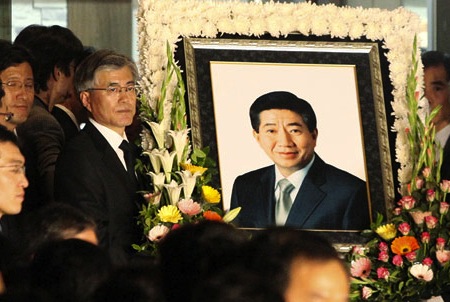Although the conservative Park Geun-hye has had to fend off challenges tying her to the worst of massively unpopular incumbent Lee Myung-bak and her father, Park Chung-hee (South Korea’s autocratic ruler from 1961 to 1979), it’s another former South Korean president who may represent the largest millstone in the Dec. 19 presidential race.![]()
Moon Jae-in, candidate of the Democratic United Party (민주통합당, or the ‘Minju Tonghap-dang’), and a former chief of staff to Roh, has essentially no political identity separate from Roh. He’s inescapably the heir to Roh, for better and for worse — for Roh’s supporters, Moon is an experienced champion of the policies Roh pursued; for Roh’s detractors, of course, Moon represents a return to the perceived incompetence and disappointment with Roh’s administration.
Park has had her challenges as the candidate of the Saenuri Party (새누리당 or the ‘Saenuri-dang’), the New Frontier Party — and formerly the Grand National Party — the party to which Lee belongs, but voters don’t associate Park with Lee because Park comes from a different wing of the party, has a vastly different management style and background, and, above all, she has campaigned as much against her opponent, Moon, as she has against Lee. If anything, voters (especially older voters) associate Park’s candidacy with her father, who gained power in a coup in 1961 and pulled South Korea’s economy into the developed world until his assassination in 1979. Voters will recall that Park (the daughter) was essentially South Korea’s first lady from 1974 onwards, when her mother was also assassinated. Despite the economic strides that South Korea made in the Park era, it made precious little progress in the area of political rights or democracy.
The campaign for human rights and a more democratic South Korea during the Park years is, in fact, the defining experience of both Roh and Moon — Roh’s emergence in South Korean politics coincided with the rise of the ‘386 Generation,’ a new generation of political leadership educated in the 1960s that came to politics demanding for greater freedoms and democracy. Moon, a human rights lawyer, was actually imprisoned in the 1970s for his activist efforts against the Park regime.
Fundamentally, the ties that bound Moon to Roh were forged during that fight — against Park’s father. Park (the daughter) has recently apologized during the campaign for the abuses of her father’s administration, although her father’s legacy probably helps Park among many Koreans nostalgic for what seems to them a golden era of growth and prosperity.
That makes this year’s South Korean election — especially with the withdrawal of popular software entrepreneur Ahn Cheol-soo from the race in late November — very much a prototypical ideological fight between the two major forces in South Korean political life for nearly half a century.
As such, it’s worth reflecting on Roh’s administration, Moon’s role in Roh’s administration, and the scandal that led to Roh taking his own life by jumping off a cliff in May 2009, which tragically elevated Moon in the public eye.
Roh’s suicide came after what many believed were politically motivated allegations of bribery surrounding his family and associates, but those allegations never really touched Moon. Nonetheless, his suicide elevated the pro-Roh faction within South Korea’s progressive scene, including Moon (shown above at Roh’s funeral), who served as counsel to Roh during the post-presidential investigation and who organized Roh’s funeral.
Roh came to office as a bit of an outsider — he served briefly as minister of maritime affairs and fisheries under Kim Dae-jung, hardly the best profile for a 2002 presidential run. But his conciliatory approach to North Korea and his calls for a more equal relationship with the United States, especially following the acquittal of two American soldiers who hit and killed two teenaged Korean girls with an armored vehicle in an accident in June 2002.
Roh continued Kim’s ‘Sunshine Policy’ toward North Korea to somewhat less than great effect, and turned out to be more conciliatory to the United States than many expected back in 2002.
But the defining aspect of Roh’s presidency was the virulent opposition he encountered from conservatives. Continue reading Roh Moo-hyun haunts Moon’s candidacy in Korean presidential race
